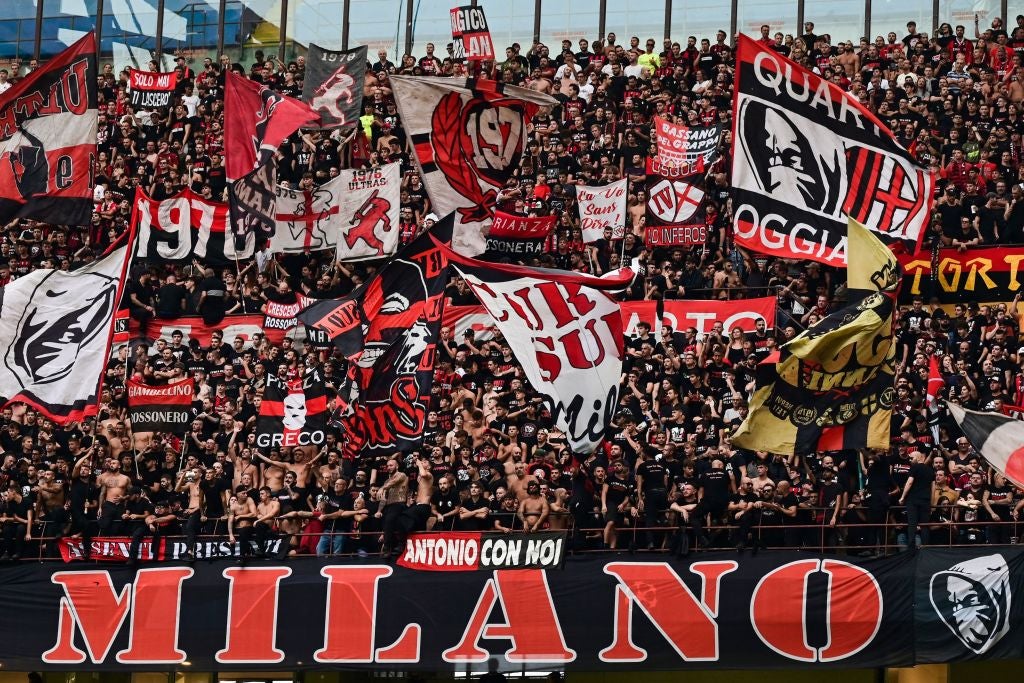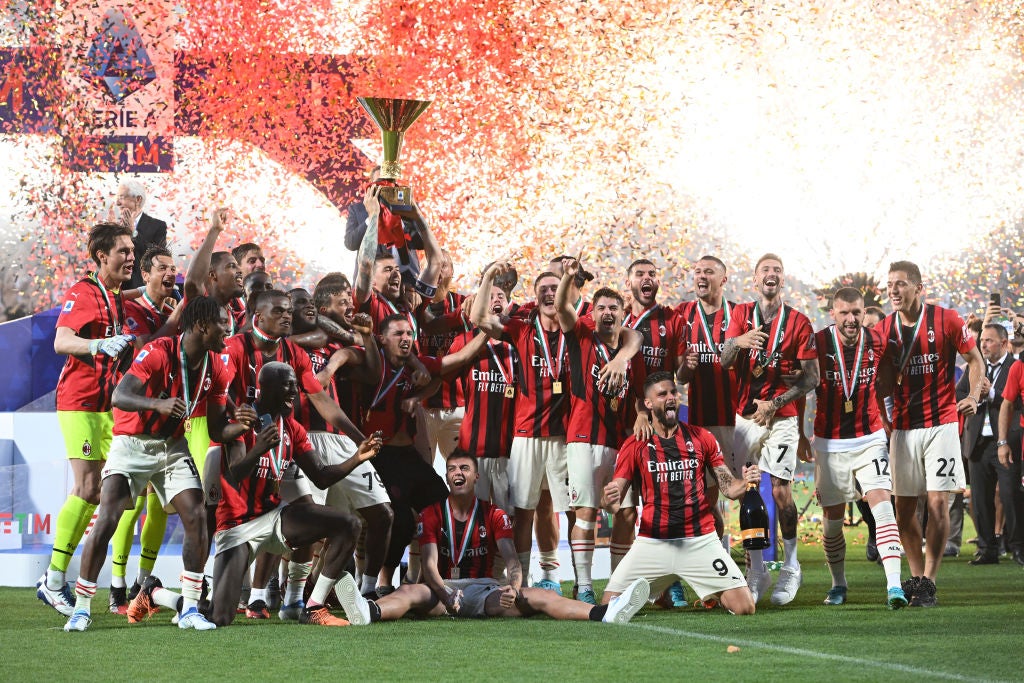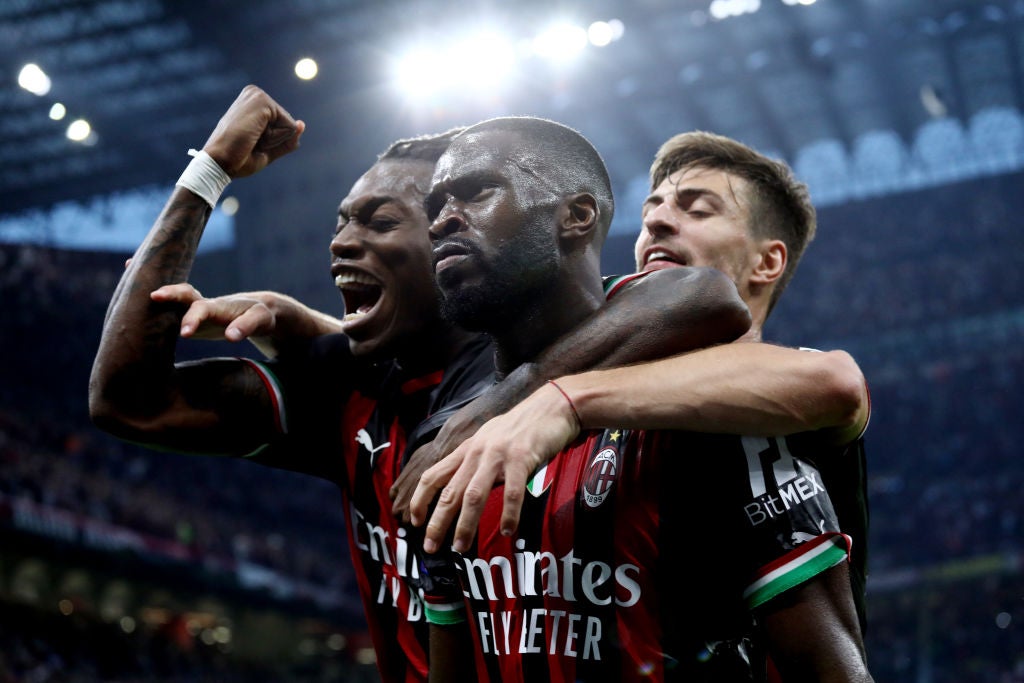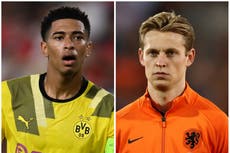In the era of the super clubs, can Milan ever be Milan again?
AC Milan stands for stars, history and glory - but after more than a decade away from the top, is it already too late for Italy’s most storied club to become what they were, asks Miguel Delaney


Back in the summer, AC Milan were involved in two major transfers, that were instructive as to where they are as a club. The Italian champions were trying to sign both Sven Botman and Charles De Ketelaere, but Newcastle United wanted the former and Leeds United wanted the latter.
Milan knew they couldn’t compete financially with the Premier League but felt they still had a chance. Both of the players, several sources insist, wanted Milan. Both consequently wanted to wait. They wanted to give Milan a chance. They had also enjoyed the chance to breathe it all in.
It is something that still strikes on walking around Milan and the San Siro as Chelsea visit this Tuesday. De Ketelaere, it transpired, was particularly struck by it.
There’s the culture. There’s the setting. There’s the sight.
The red girders and circular pillars of the San Siro are among those rare monuments in football that instantly conjure infinite images of so many stars and so much glory. This is football history. You can obviously see why so many of the greatest players felt this so suited them. Milan were a guarantee of excellence, the standard to reach. The scale of club, in the 1990s especially, is almost unimaginable now. This is what club great Zvonimar Boban was getting at when discussing transfer targets during one meeting with the hierarchy a few years ago.
The Croatian made an impassioned statement over what “a Milan player” is. Boban believes it is someone with the character and charisma to carry that shirt, and that history.
It’s just that this is a very different present, where Milan are competitive but not one of the most compelling forces. It provokes a defining question.
Can Milan ever be Milan again? Can they be the club that has enriched so much of football history, signing the stars and creating the teams that offer landmarks in that history? Can they add to the seven Champions Leagues that still remain the best return after Real Madrid’s 14?

The summer’s transfer negotiations sum up the challenge.
De Ketelaere was able to resist Leeds United’s slightly superior financial offer to join but Botman couldn’t resist Newcastle’s much greater offer. The centre-half wanted to give Milan the best possible chance to match the contract set down by the Saudi-owned club, which was why the transfer took so long, but money dictated otherwise. It was just too much. Milan - the club of Marco van Basten, Kaka, Andrea Pirlo, George Weah and Gianni Rivera - couldn’t compete with Newcastle.
Last week’s Champions League match with Chelsea summed up the effect of all this.
Missing up to six main players, Milan were a shadow of what they should be. Their ability to take on Chelsea evaporated, as the Premier League club brushed them aside in the manner of a routine group-stage game. Milan now face a fight to qualify for the last 16, similar to a Sporting Lisbon or PSV Eindhoven.
This all points to the main reasons for their current position. Italian football has drastically fallen over the last decade, as the Premier League has enjoyed seismic growth. That has created this immense financial imbalance, that is toppling over the entire game. Milan's annual revenue is currently a mere €161m, which places them 30th in Europe and behind 14 English clubs.

The wonder is whether even a club like this can adapt to these circumstances to return to what they were, if the game stays in its current form?
Milan do enjoy some advantages - both intended and inadvertent - that have allowed them to be flexible, and were key factors in winning Serie A last season for the first time in 11 years. The 2016 sale forced a financial readjustment that meant the club was effectively “on a Covid budget before Covid”. It meant, by the onset of the pandemic, the club didn’t suddenly have to shed a lot of overpaid players. They had already started to adopt the German-influenced analytical approach that is currently proving so effective.
That essentially means buying young players before they are all that known or expensive, so you can generate a high-energy pressing team as well as high-priced sales.
The newest owners have only doubled down on this. They have introduced a new algorithm and fully believe in it.
This has similarly been complemented by old-fashioned football insight. Technical director Paolo Maldini, unlike the departed Boban, has bought into it. He was on the Stamford Bridge pitch before the game last week, adding traditional stature to modern ways.
Maldini and sporting director Frederic Massara essentially shape the analytical approach for the market. Those who have worked with them say they are keenly aware of their price range, why it’s in place, and how it translates to the market. They are very astute at quickly deciding if a pursuit is a waste of time.
That appreciation of value has brought them a priceless Scudetto. So far, so good - but only to a certain level.

The inherent challenge with Milan’s approach is that such models inevitably get into a situation where they are almost constantly replenishing the team. Any time they have success, wealthier clubs will buy their players.
That income will keep making them wealthier, but it won't come in at the pace required to constantly keep the team at the same standard. There will be inevitable drop-offs, that then further slow regrowth.
This is something everyone from Southampton to Ajax and even Liverpool have found. You can't keep indefinitely selling without suffering some effect. This isn’t to criticise the model, since it remains the best solution in an imbalanced game, but it is the inescapable and unavoidable complication.
It also raises the question of whether these clubs inevitably hit a ceiling.
This is where Milan’s history, and the future of the game, is so relevant.
The big fear in Italian football right now is that their great clubs will end up like Ajax, or Porto; that they will be historic names who have to adapt to this football no man’s land - too big for their own league, too small for the Champions League.
Milan’s history at least gives them an advantage. They are a world-renowned brand, with a huge global fanbase, that chief executive Ivan Gazidis has argued can be quickly revived like Liverpool.

“These things don’t disappear,” Gazidis told the Italian football journalist James Horncastle.
One club source says: “That's not just about player trading and increasing centralised media rights, but maximising the commercial potential of one of the most iconic brands in world sports and ensuring that the club has a stadium that matches both its history and its ambitions.”
There is financial potential there. There is also potential evolution in the market. Despite Florentino Perez’s bizarre claims about how American sport is outstripping football, the feeling in the United States is very different. There, billionaires and consortiums are queuing up to buy European clubs. They have recently realised that football is the most powerful cultural force that has ever existed in terms of how many borders it crossed, and that it has not yet been mined. The major attraction right now is the Premier League, naturally enough, but there are only so many clubs to buy.
The next tier of billionaires have to go elsewhere. Germany is off-limits due to 50+1. Spain’s big clubs can’t be sold. That leaves Italy, and is going to create ructions, and shifts. There are already 12 US owners in Italy’s top two divisions. The next Serie A TV deal is in 2024. All of these factors could come together to make that contract huge. It will bring better deals and commercial revenue.
It may eventually bring new buyers for Milan.
Because, on the other side, there are questions about the current RedBird owners. Some in the industry believe their algorithm isn’t advanced enough to be resoundingly successful, although club sources would insist this is still a transitional period. There’s also a feeling that their aims aren't ambitious enough, given that they are content to qualify for the Champions League every season even though they have an opportunity now to be Italy’s leading club again.
They could properly usurp Juventus. Within the club, there is an insistence Red Bird want “to restore Milan back to domestic and European prominence.

Mention of Juventus, and their troubles, also reminds of another vision of the future - and how the sport may not remain in this form.
Juventus are pressing ahead with Barcelona and Real Madrid in the Super League project and challenging Uefa in the European Court of Justice. An initial judicial conclusion is expected in December, before the next step is decided in early 2023.
One potential future for European football is a central European Super League, as a competitor to the Premier League.
Milan were involved in the initial project. The feeling from sources within the Super League now is that it wouldn’t take much to bring such clubs back in.
For now, it may be easier than Milan returning to their stature as one of the most glorious names in the game.
The Premier League is a huge mountain in the distance, that can only be reached step by step. It might even take an earthquake.
Join our commenting forum
Join thought-provoking conversations, follow other Independent readers and see their replies
Comments


Bookmark popover
Removed from bookmarks